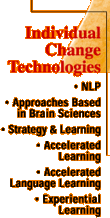 |
|||||
 |
|||||
 |
|||||
 |
 |
||||
Most people will have had the experience of "training" being less effective than it needs to be. This is especially true when training is for "soft" areas such as motivation, belief systems, and organisational alignment.
The reason that training often does not generate the results it should is that participants fail to make the link between what they are learning and the real, every day issues that they need to face at work. The comment often heard is "it’s great in theory, but....." Quite simply, strategy and learning have been disconnected.
Learning can never be forced on an individual. And, one of the key factors dictating whether something is learned or not is the level of motivation of the learner. A highly motivated individual will learn, and apply new learning, easily and effectively. Unmotivated individuals will not learn, irrespective of the quality of training and the materials provided. So, a key to generating effective learning is motivating the learners.
Motivation for an adult depends in large part on relevance. If something is considered relevant to a person’s job or quality of life, motivation to learn will be generated much more easily.
In our model (link to CLA Change model page) of organisational development we believe that learning must be connected in a clear and unequivocal way to real work and/or life issues being faced by people in an organisation. As a consequence, we frequently put learning and strategic planning into the same process.
For instance, we will work with key constituents in an organisation to develop medium to long term strategic plans. As part of this planning process, however, we will build in short learning modules, or exercises that relate both to the development of the new strategy and the learning of new skills. So, people involved in the strategic planning process are learning as they plan. And, because the learning is seen as being directly relevant to work, it is taken on board easily.
At other times, where learning is the key objective, we might challenge the learners to think about strategic issues for their organisation. In this way they are able to link their new learning to the overall success of their organisation.
In deciding when to integrate learning with strategic planning and alignment we will generally need to first investigate ( link to Investigative and Analytical Services page) the current status of the organisation, and identify key leverage points for generating change and growth.
...Chris Lonsdale and Associates staged an
especially innovative workshop for some 40
participants. The "players" were assigned to
a manufacturing operation - a "tile maker's
factory". Here they fulfilled all the
traditional management roles under realistic time
and cost pressures... It confirmed opinions
we held about certain procedures we felt were
inhibiting the development of interdependency
in a non-cultural work environment. With
modification in the workshop, real life
personal and group behaviour was improved, and
conflicts were resolved, without disruption
to the day to day workings of the company.
WM Thomson, Director,
DuPont External Affairs, Asia Pacific